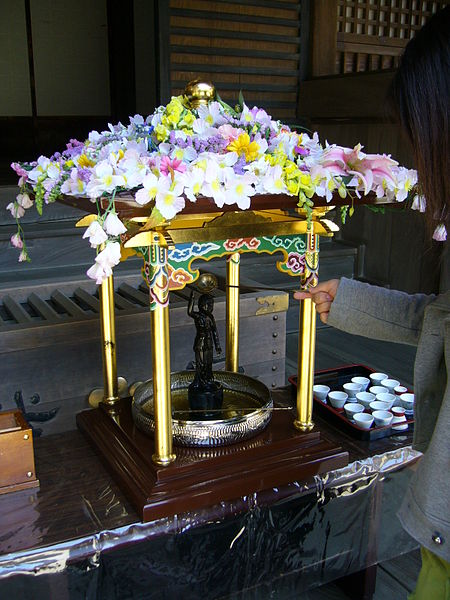 |
| Set-up for bathing the Baby Buddha on his birthday (Wikipedia) |
Note: Most Buddhists celebrate three events in the life of the Buddha: his birth, enlightenment, and death--though different cultures celebrate them according to very different schemes.
Get Ready: What do you know about the life and teachings of the Buddha? Where and when did he live? What is the point of what he said?
Any discussion of Buddhist holidays can become quite complicated. They usually are determined not by the Western calendar, but by any one of a number of traditional lunar-type calendars. Most of these traditions developed in isolation from each other so--just as in the Christian tradition, the eastern Orthodox and the Western churches may celebrate Easter on different days (though they sometimes coincide)--various countries and cultures celebrate Buddhist observances on different dates.
To make things more complicated, some Asian cultures have moved some of their dates to the Western calendar, and furthermore, in this age of easier communication and reducing isolation, some schools of Buddhism have agreed to synchronize their celebrations with those of other cultures.
In the Theravada Schools--sometimes pejoratively called the Hinayana or "Lesser Vehicle," found in the southern Buddhist countries--one date suffices for all three of the major events in the Buddha's life: (1) his birth; (2) his attainment of Enlightenment; and (3) his death (or "Final Nirvana"). This date is commonly called Vesak, though there are many forms of the name. Informally called "The Buddha's Birthday," it usually accommodates all three of the major events cited, and can be celebrated on the full-moon day of April, May, or June, depending on the school.
In the Mahayana tradition found in East Asia, the three events are separate. The birth is most commonly on a date similar to Vesak (and may be identical), though in Japan it is always on April 8th (analogous to the "eighth day of the fourth month" in traditional calendars). There it is called Hanamatsuri or "Flower Festival."
Celebration of the Enlightenment is generally determined by the date of the full moon in December (or sometimes January), though in Japan it is fixed on December 8. English speakers call it "Bodhi Day," after the Sanskrit word for "enlightenment."
Finally, the Buddha's death, or attainment of "Final Nirvana," can be celebrated on widely disparate dates, but these days it is often placed on February 15 or, less commonly, February 8.
--------Read more:
- Birth: https://en.wikipedia.org/wiki/Buddha's_Birthday
- Enlightenment: https://en.wikipedia.org/wiki/Enlightenment_in_Buddhism#Buddha's_awakening
- Death: https://en.wikipedia.org/wiki/Parinirvana#Parinirvana_of_Buddha_Shakyamuni
Practice: Match the term to its definition below:
- accommodates
- analogous
- cited
- coincide (with)
- disparate
- in isolation (from)
- pejoratively
- schools
- synchronize
- vehicle
- of a different kind
- a means of communicating something
- apart (from)
- followers of one master or way of thought
- corresponding to
- named; mentioned
- happen at the same time (as)
- cause to happen at the same time
- insultingly
- includes; makes room for
Answers are in the first comment below.
Submitted to the Shenzhen Daily for February 23, 2017


Answers to the Practice: 1. j; 2. e; 3. f; 4. g; 5. a; 6. c; 7. i; 8. d; 9. h; 10. b
ReplyDelete